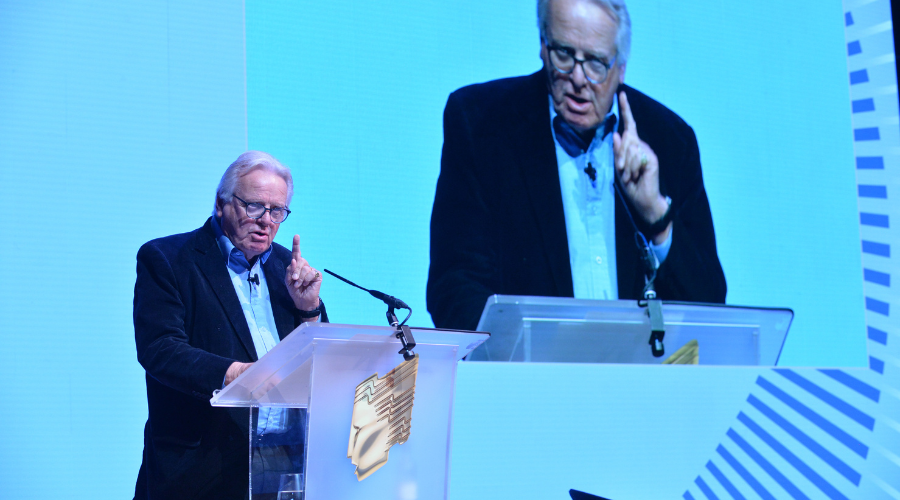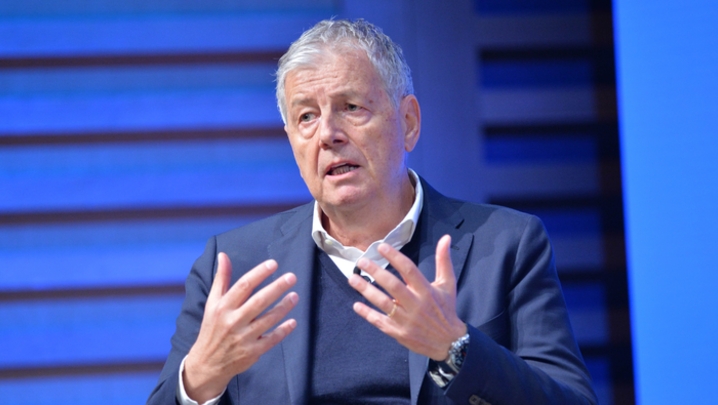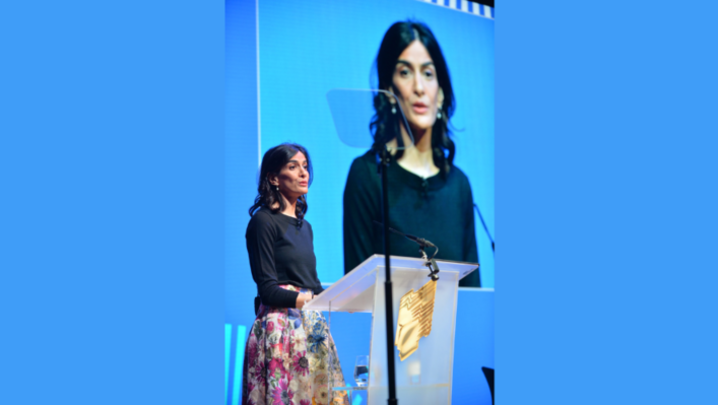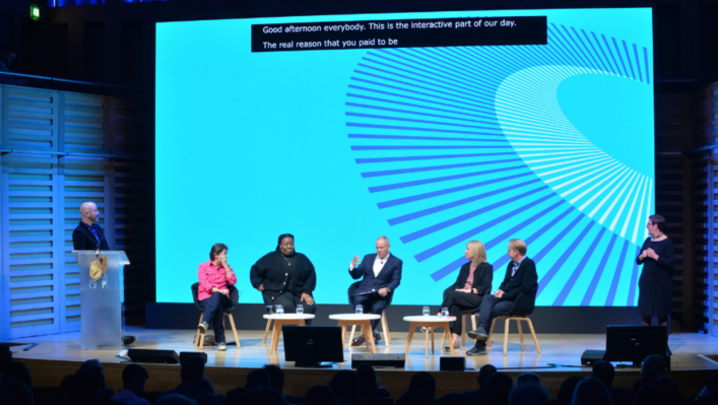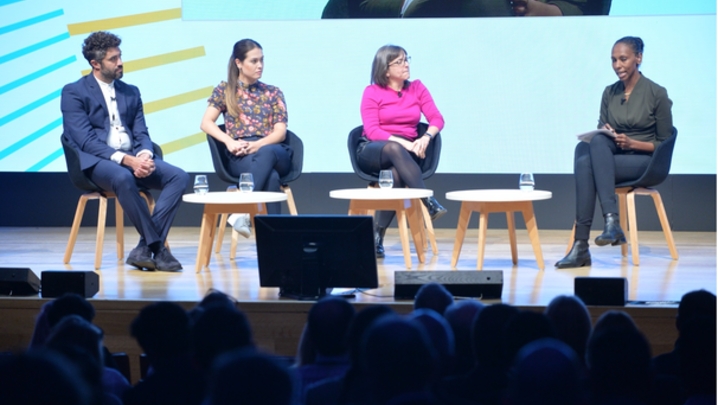In his first speech as Ofcom Chair, Michael Grade urges broadcast journalists to avoid being shrill and shocking.
I am proud and privileged to speak to you now as the Chair of Ofcom at an important moment in its history. Ofcom is gearing up for a new challenge. Under the Government’s Online Safety Bill, we will be given new powers to hold some of the world’s biggest and most powerful tech companies to account.
Our research shows that people are increasingly concerned about harmful online content – for themselves, and for their children. There is an urgent need for sensible, balanced rules that protect users from serious harm.
These plans have not been without their critics, in Parliament and elsewhere. Some say Ofcom won’t have an impact; that a regulator in the UK cannot change the behaviour of global tech giants; or that the volume of online harm is just too great to tackle. Others say the Bill will have too much impact, stifling freedom of expression.
Let me respond, starting with free speech. After all, that is the heartbeat of the internet. At Ofcom, we have 20 years’ experience of preserving it across broadcasting. Just look at the numbers. Last year, we assessed more than 11,000 pieces of TV and radio content. After taking account of freedom of expression, we found only 29 in breach of our rules.
What about the volume of harm? Clearly, we must be realistic. It would be impossible to attempt to assess content as we do in TV and radio. In the few minutes that I’ve been speaking, about 3,000 hours of video will have been uploaded to YouTube alone.
The Bill lays the burden on platforms to reduce harm. We want to shift their mindset. We need a new era of accountability, where companies have to prioritise trust and safety alongside clicks and profit. We know that many services take steps to protect their users. But these initiatives have not been sufficient to restore people’s trust and confidence.
Over time, big tech firms must shift their regulatory responsibilities from the public policy departments – where they sit today – to the frontline staff responsible for designing and operating their products.
"I care on a personal level about the need for tolerant debate"
At the moment, I see the world of online regulation being accepted and well understood by those whose job it is to worry about such things – namely the policy and strategy teams.
But, like bankers who think their compliance department belongs to a galaxy far, far away, those who design and operate the tech platforms are not routinely touched by safety regulations. Under the planned laws, Ofcom will have powers to summon people with day-to-day responsibility for users’ safety on the sites and apps themselves. This represents a very meaningful, overdue shift in the regulatory culture of big tech.
As the inquest into Molly Russell’s tragic death reminds us, this is an urgent task. We have spent the last two years preparing. Ofcom is hiring expert minds from across the tech industry.
We’ve established a data innovation unit, and a tech hub in Manchester. We have published world-leading research about online harm and how it might be addressed – from risk in algorithm design to the use of AI in content moderation. Just last week, we explored research models for assessing online harm. This autumn, we’ll release studies on age protection, risks to children, hashing technology, online terrorism and hate speech. We will also publish our forensic analysis of the online response to the Buffalo shooting.
All that research is helping to form an expert evidence base. It will also help us anticipate change and respond to a fast-moving market.
Just think…. A couple of Christmases ago, as the Government was confirming the online safety plans to Parliament, two French entrepreneurs were launching BeReal. As you’ll know, this platform lacks the conflict and curation of some other social media. Now it has topped Apple’s app chart, as part of a cultural shift in how younger people want to use social media.
There are signs that users are tired of the endless pressures of self-presentation. Or maybe, like me, they’re concerned by the tone of interaction and debate on social media.

I believe the tone of social discourse online reflects the polarisation of wider society. What were once civilised, legitimate debates about politics, society and culture are now escalated and characterised as culture wars. Traditionalist and progressive groups are locked in a seemingly endless struggle to impose their beliefs, their values, their vocabulary. Important but divisive issues – from Brexit to Covid restrictions or personal rights – have become angry battlefields of bitter division.
Now, I have had arguments all my life with politicians. I might confess to some of them even being heated. But when these important debates cross the line, when they are conducted with aggression, prejudice or a tone that borders on the hateful, we all stand to lose.
When they are debated instead with passion, but also with respect and an open mind, we can bring people together and find answers that help us move forward. I have learned, in debates in the House of Lords, that tone is everything. Politeness gets you a hearing; angry, intolerant argument gets you nowhere.
I care on a personal level about the need for tolerant debate. That matters to me not just as a citizen and parliamentarian, but also as someone who has sought to champion our world-class broadcasting sector. Because broadcasting has a unique ability to provide a fair, accurate and trustworthy platform for calm, considered voices, those views are more necessary than ever for a stable society and a strong democracy.
We need “due impartiality”; but we also need trust. In other words, perceptions of impartiality matter, too. And our latest research shows they could be stronger. Around six in 10 trust TV news – a little higher for Sky News, at seven in 10. Why aren’t all our broadcasters doing even better on this measure?
Impartiality is a hugely complex area. Ofcom’s research shows that many factors influence people’s perceptions here, including how strongly they feel about a given issue. We published some interesting research on impartiality this summer. It was based on BBC content, but the findings are relevant to all. When participants looked at a news report, their impressions of due impartiality were often based on signals around how it was presented, such as the presenter’s tone.
"PSB is the place where culture meets commerce"
Just as on social media, tone matters. We all want television – and, indeed, radio – journalists to do what they do best: hold people to account, cross-examine their motives and test their views. I believe they can do all of this in a measured manner.
Of course, broadcasters need to find an audience for their content on social media. In trying to reach younger people, who watch seven times less linear-TV than over-65s, clicks might matter more than viewership.
But in the fight for attention, traditional broadcasters will never match social media’s capacity for the shrill and the shocking. Nor should they try. Instead, we look to them for calm, forensic analysis and interrogation.
I hope this will be taken in the right way: as an observation from someone who cares deeply about our broadcasting industry, and who spent many decades in our public service broadcasting sector. I appreciate its values and its value.
How should we, as a nation, best arrange the PSB system to sustain its future over the next decade? Some aspects of PSB are currently up for debate. There are long-term questions to answer: BBC funding, Channel 4 ownership, and how legislation might level the playing field where PSBs compete with US streamers. These are matters for government and Parliament, not Ofcom.
But on one thing we can all agree: the creative industries sector is one of the great British success stories of the past 50 years. Our industry talent – from chippies to grips, screenwriters, designers, make-up, special effects, directors and actors – are in demand all over the world.
British viewers and listeners enjoy a rich and varied diet of British-made programmes. As Ofcom found last year in our review, Small Screen: Big Debate, the strength of our traditional broadcasters lies in their ability to do something US platforms often cannot: to appeal to people from all backgrounds, to reach and serve all parts of the UK. PSB is the place where culture meets commerce. We must never forget the cultural importance of its heritage.
And while the industry has more to do on diversity – most particularly behind the camera – on screen, we have made wonderful progress since I started in broadcasting.
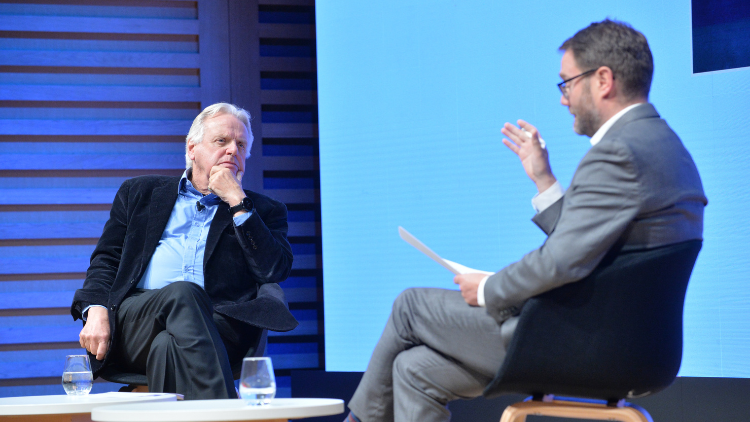
For all these reasons, any proposed changes to our PSB arrangements must be tested against their potential impact on investment in our creative industries. Quite simply, these achievements have been a triumph of public policy. We must do nothing to put them at risk. I am certain Parliament will have that in mind as it reviews the current arrangements.
US streamers have transformed and captured the UK market. Online platforms are reshaping the way we discover and consume content, providing unprecedented choice, but also making it harder for home content providers to compete.
We have been working with the Competition and Markets Authority on a new code of practice, including some basic rules on the relationship with publishers. The aim is to help ensure the trading relationship between big online platforms and publishers is fair and reasonable. This will complement our work on media plurality, where we consider the breadth of UK news providers.
In short, there is work to do – but I am optimistic for the future. The Government has heard our recommendations, and the Media Bill provides the opportunity to define a new future for public service broadcasting.
On my watch, Ofcom will strive to maintain its reputation, above all, for political independence and for decisions and judgements based on evidence and research. And we will continue our work to promote growth, competition and investment, while ensuring that audiences are rewarded, and – especially during current times – that services remain affordable.
No other country can match the talent, creativity and heritage of our broadcasting sector. To all of you who work in it, my message is that you can thrive by focusing on your strengths: making outstanding programmes for UK audiences and bringing calm impartiality to the national debate. In those respects, we have never needed you more.
Thank you for listening. I just hope I got the tone right.
Question & Answer
Session chair Chris Curtis: You’ve talked a lot about the importance of tone and, in some cases, you think the tone of PSBs is letting them down. Are you thinking about particular topics or interviewing style?
Michael Grade: Mainly interviewing style. I heard one interview during the Conservative leadership campaign where somebody asked Rishi Sunak if he was slick and rich. I’m not quite sure that’s appropriate…
It’s not about bias, it’s about tone and language. Some of the great interviewers don’t have to be aggressive or overstate and use emotive language like ‘liar’ and so on in an interview. We need to understand and test, but we need to get the tone right…. It’s not about impartiality. We live in a very confrontational society.
Our legal system is confrontational and so is our legal system. But there are rules and boundaries. I’d like to see us move much more towards civilised debate, which is not to say you shouldn’t ask the most difficult questions. Absolutely. It’s the tone in which you do it. I think tone is important.
You said in your speech: ‘The achievements of the PSB ecosystem are a triumph and that any proposed changes must do nothing to put those achievements at risk and must be tested against their potential impact.’ Does privatising Channel 4 fall under that description?
People know my personal views pre-Ofcom. This is now entirely a matter for the Government and Parliament. It’s not a matter for Ofcom whatsoever. You can argue the Channel 4 case every which way. In the end it will be for Parliament to decide.
This is an edited version of the speech given by Ofcom Chair Michael Grade in Session Ten, ‘UK keynote: Michael Grade’, which was followed by an interview with Broadcast editor Chris Curtis. The producer was Sue Robertson. Report by Steve Clarke.

